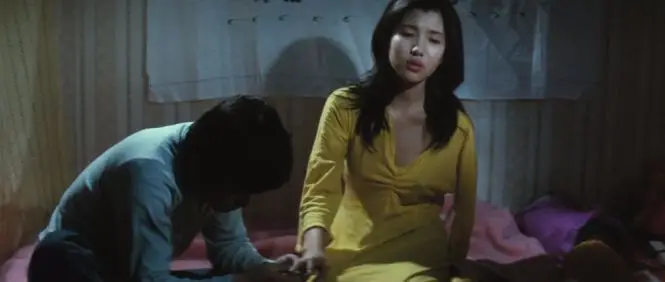“I’m a person too. And sometimes I can get sick!”
Yeong-ja’s Heydays (영자의 전성시대) 1975
Directed by Kim Ho-sun Yeong-ja’s Heydays (영자의 전성시대), 1975, achieved massive box office success, drawing an audience of 360,000 to theatres in Korea. Song Jae-ho gained significant recognition through his portrayal of likeable Chang-su. At the same time, Yeom Bok-sun stars as the title character Yeong-ja. The film’s ironic title downplays the suffering Yeong-ja experiences throughout the story. Its categorisation alongside other ‘Hostess films’ popular during the 1970s, a time marked by state censorship under the Park Chung Hee regime, may have contributed to its initial success.
The narrative begins with Chang-su meeting Yeong-ja at a prison station and flashes back to when they first met; Yeong-ja was working as a housemaid in his boss’s house. When Chang-su is enlisted in the military, he asks Yeong-ja, whom he has fallen in love with, to wait for him. Unfortunately, Yeong-ja loses her job due to the actions of the boss’s son. She is forced to leave the household and begins working as a bus conductor, tragically losing her arm due to an accident. Eventually, when she feels she’s exhausted all of her other options, she becomes a prostitute. Now caught up in Yeong-ja’s journey to the present, Chang-su does his best to help Yeong-ja escape her dire situation. However, she feels compelled to provide for herself, wanting to contribute positively to his life aware of the social criticism he is receiving for wanting to be with her.
The film depicts Yeong-ja’s downfall in a society that offers her little opportunity for success. She is reminded by a friend that money is necessary to achieve dreams and that learning a skill is often seen negatively for women. Her work at a sewing factory earns her very little income. While both main characters are ‘good people,’ Yeong-ja’s body has been ‘diseased’ by her role in society, and despite Chang-su’s efforts to aid her recovery, she is limited by her circumstances.
Kim Ho-sun employs point-of-view shots, overlays, and muted sounds to create moments of surrealism. The film features popular trot music alongside an excessive style and a vibrant color palette, with Yeong-ja wearing bright yellow and red during significant scenes, perhaps expressing her more naive true self and the new her Seoul has created —common elements of 1970s cinema.
Themes in the film include the exploitation of female labour, the sacrifice of women, and how the rise of female workers coincides with their simultaneous mistreatment in precarious positions. The sanctioning of prostitution for U.S. soldiers in military camp towns, contrasted with its prohibition elsewhere, highlights the nature of society at the time of the film. The women can sacrifice their bodies for the ‘good of the country’. The narrative explores the commodification of women’s bodies, exemplified by Yeong-ja losing her arm, which is almost treated as a business transaction, traded for compensation. Then her body is sold for sex, while Chang-su cleans men’s bodies at a sauna for money. The film critiques the view of women as mere tools for capitalism, essential for the country’s development, but objectified for men’s gain.
For a ‘hostess’ film and given its popularity, “Yeong-ja’s Heydays” presents an exceptionally somber perspective. The film does not shy away from providing political commentary on the struggles faced by women in 1970s Seoul. In what is considered a dark period of Korean cinema, in large part due to heavy content restriction Kim Ho-sun does a wonderful job of bypassing the censorship and creating an apt critic. Therefore, Yeong-ja’s Heydays is a must-watch regarding films from the 1970s.
